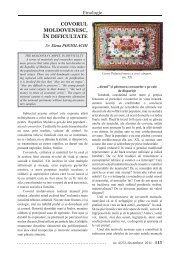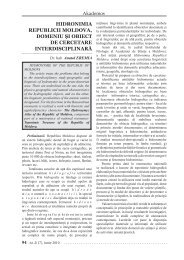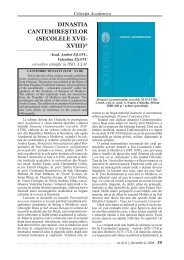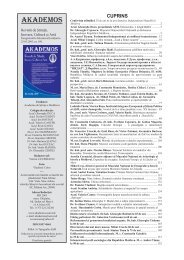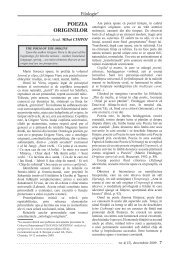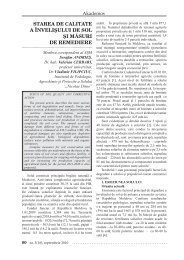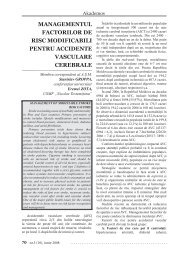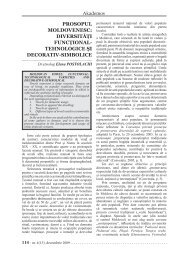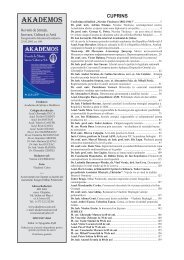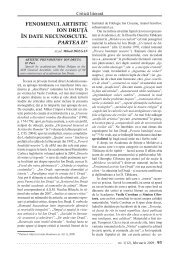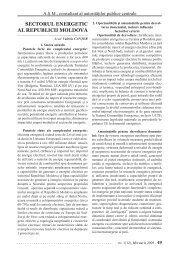Academos 3 2008.indd - Akademos - Academia de ÅtiinÅ£e a Moldovei
Academos 3 2008.indd - Akademos - Academia de ÅtiinÅ£e a Moldovei
Academos 3 2008.indd - Akademos - Academia de ÅtiinÅ£e a Moldovei
Create successful ePaper yourself
Turn your PDF publications into a flip-book with our unique Google optimized e-Paper software.
<strong>Aka<strong>de</strong>mos</strong><br />
Senility: Nature turns from a kind parent into<br />
a merciless stepmother. Mo<strong>de</strong>rn clinical poetry,<br />
changing from “sacrament” to “excrement”, exposes<br />
many facettes of old age as <strong>de</strong>bility. Here a little<br />
portrait from a mo<strong>de</strong>rn rest home – an old woman<br />
eating – or, rather, being fed. What Swift so <strong>de</strong>eply<br />
felt – “Man is the slave of his metabolism” –, here<br />
we have it:<br />
“And she, being old, fed from a mashed plate<br />
As an old mare might droop across a fence<br />
To the dull pastures of her ignorance…<br />
She munched, half <strong>de</strong>ad, blindly searching the<br />
spoon.”<br />
Handwriting turns spi<strong>de</strong>ry, the vision blurred.<br />
Nobody would expect a phoenix hour after 70,<br />
but the silent erosion of memory, <strong>de</strong>veloping into<br />
amnesia, changes many old people into Homeric<br />
“lotus eaters” who lose contact with everything: “We<br />
have had enough of action…” Weeds have grown<br />
among familiar tracks… – “Bonjour tristesse”! And<br />
here Arnold again on oblivion:<br />
“Forgotten are the names of our visitors<br />
Ready to press my hand but yesterday;<br />
Forgotten are the names of earlier friends<br />
Whose genial converse and glad countenance<br />
Are fresh as ever to mine ear and eye;<br />
To these, when I have written and besought<br />
Remembrance of me, the word Dear alone<br />
Hangs on the upper verge, and waits in vain.<br />
A blessing wert thou, O oblivion,<br />
If thy stream carried only weeds away,<br />
But vernal and autumnal flowers alike<br />
It hurries down to wither on the strand.”<br />
Frustrated hopes become fears, fears obsessions,<br />
obsessions fixations: In Ibsens Wildanten we see old<br />
Ekdal chasing the wild ducks of his illusions in the<br />
attic: a victim of guilt and senility… Forgetfulness<br />
and garrulity, anecdotage and aphasia form ever<br />
changing patterns of behaviour. And <strong>de</strong>mentia,<br />
<strong>de</strong>pression – are they not “lyres without strings”,<br />
“mirrors without glass”? But still: The latest, the<br />
strangely chaotic poems of aged Höl<strong>de</strong>rlin confirm<br />
and sublimate in almost unbelievable beauty<br />
what the poet in his younger years foresaw as his<br />
own hopeless winter after an autumn of “mellow<br />
fruitfulness” (Keats): we have heard it!<br />
Old age in literature? Yes, man is more than a<br />
human being “as old as its arteries.” The power of<br />
imagination can create symbols of the “hopeless<br />
hope” of old age that endure and survive the misery<br />
of senility. Poems may become timeless documents<br />
of humanity. In the Indian Dhammapada I find such<br />
a timeless image of the human condition, dating<br />
from the third century B. C: “Old men are long<br />
legged herons standing sadly but a lake without<br />
fish…”<br />
7.<br />
Fascinating as this haiku-like metaphor may<br />
be, it is not quite true. Let me, therefore, open<br />
another, important perspective. Sartre, Faulkner,<br />
Jaspers, Hei<strong>de</strong>gger: They <strong>de</strong>scribe again and again<br />
the misery and greatness of man on the verge of<br />
annihilation, confronted with boundary situations.<br />
And protagonists of “Old Age” too, “in extremis” and<br />
in these “Grenzsituationen” communicate shocks of<br />
recognition to us mo<strong>de</strong>rns: ageing Captain Ahab in<br />
Melville’s Moby Dick, Hemingway’s The Old Man<br />
and the Sea, and Shakespeare’s King Lear.<br />
It is to Shakespeare – a poet who knew ageing<br />
but not old age – that we owe the greatest tragedy<br />
on the fall of an aged king into the abyss of senility<br />
and his temporary re<strong>de</strong>mption by the power of love<br />
and patience: King Lear. The very incarnation of<br />
the <strong>de</strong>adly sin of wrath, “ira” –, the king divi<strong>de</strong>s his<br />
kingdom in a fit of <strong>de</strong>mentia, blind to the criminal<br />
energy of Goneril and Regan, and blind to the<br />
natural love of his youngest daughter, Cor<strong>de</strong>lia. The<br />
old king has to go through suffering and madness<br />
to find his way from autistic, uncontrolled wrath to<br />
quiet acceptance, from “ira” to “patientia”. The aged<br />
monarch – over 80 – turns into an old man, homeless<br />
and naked. In<strong>de</strong>ed, reduction to nakedness: the<br />
emblems of pomp and circumstance gli<strong>de</strong> from his<br />
shoul<strong>de</strong>rs, as in his language the heavy ornament<br />
of baroque imagery is reduced to the diction of<br />
“nuda veritas”. Dying of an obvious cardio-vascular<br />
condition, he can say: “Pray you, undo this button.<br />
Thank you, sir…” – last words extremely human,<br />
mo<strong>de</strong>st, plain, signalling quiet reconciliation at the<br />
boundary to <strong>de</strong>ath. This is no longer the raging old<br />
man who, exposed on the stormy heath, could curse<br />
creation down to its very genes and chromosomes:<br />
“Blow, winds and crack your cheeks! rage! blow!<br />
You cataracts and hurricanoes, spout<br />
Till you have drenched our steeples, drowned the<br />
cocks!<br />
You sulph’rous and thought-executing fires,<br />
Vaunt-couriers of oak-cleaving thun<strong>de</strong>rbolts,<br />
Singe my white head! And thou, all-shaking<br />
thun<strong>de</strong>r,<br />
Strike flat the thick rotundity-o’th’world,<br />
Crack Nature’s moulds, all germens spill at once<br />
That make ingrateful man!”<br />
King Lear: old age in literature, old age on the<br />
verge to annihilation: What Virgil calls “lacrimae<br />
rerum”, the speechless tears of existence in a fragile<br />
world – we recognize them in the very words of<br />
this tragedy of senescence, telling us that even the<br />
“nuda veritas” of an Aristotelian insight into human<br />
18 - nr.3 (10), iunie 2008



